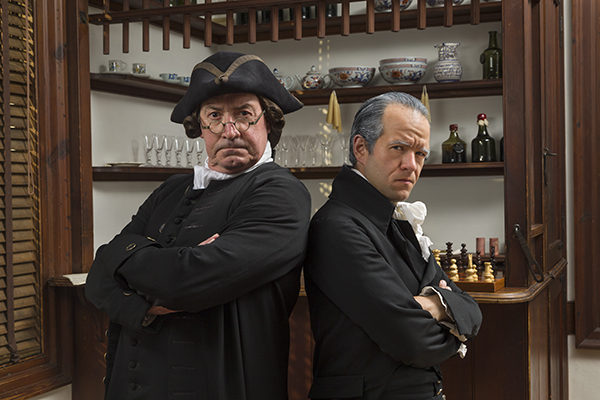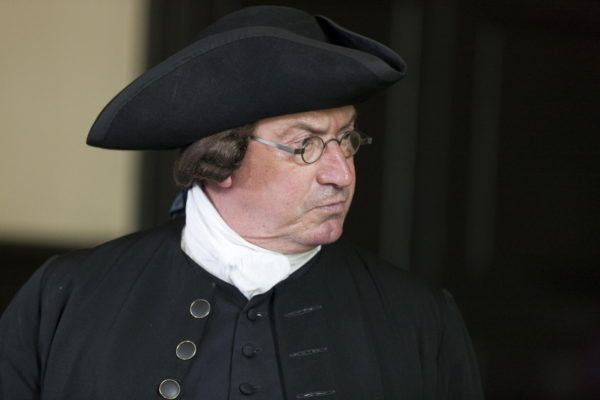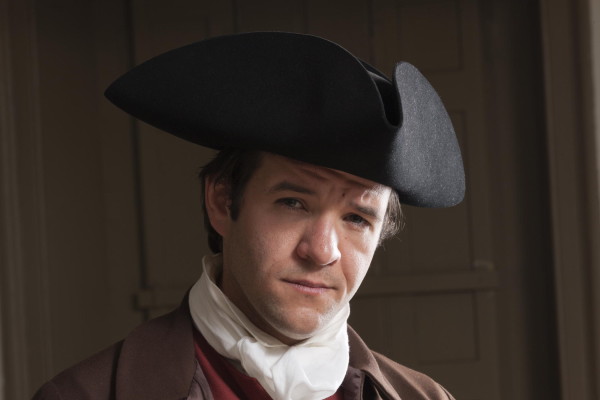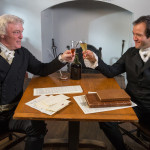
Not long before the separation of church and state was enshrined in the Constitution, Virginia nearly passed a bill that would have drawn the institutions more closely together. At the time, this great philosophical question was intertwined with an utterly practical one: how should we take care of each other?
The time is late 1785, and Patrick Henry’s assessment bill, which would have directed taxes to churches, has failed to win the third vote that would have made it Virginia law. In this conversation at Christiana Campbell’s Tavern, Henry and state legislator James Madison wrestle with the ramifications of the bill’s failure.
Henry’s irritation with Madison is palpable. Indeed, their differences would only increase over the course of the next few years with the passage of the new federal constitution and the contentious ratification debate in Virginia.
But we’re getting ahead of ourselves…
In 1784, Henry was not alone in fretting over the nation’s future. In Virginia, the loss of state support during the Revolution had left churches in a woeful condition. There were far fewer ministers and fewer resources to care for widows, orphans, and, now, disabled military veterans.
Perhaps just as significant, the weakening of religious institutions threatened the moral life of the people.
Henry’s solution, the assessment bill, proposed directing tax money to churches. Unlike before, any Christian denomination—even Baptists and Methodists—could receive funds.
“The general diffusion of Christian knowledge,” he said, “hath a natural tendency to correct the morals of men, restrain their vices, and preserve the peace of society.” Other Revolutionary leaders from Virginia, including George Washington and Richard Henry Lee, tended to agree.

The bill passed on its first reading, 47-32. Two more positive votes and it would become law.
34-year old James Madison took up the charge against the bill, fearing that it was an unconscionable commingling of religion and government, exactly the kind of thing lovers of liberty were supposed to oppose.
But liberty means different things to different people, and in the 18th century, the notion that one would want to completely divide the civil from the spiritual was novel indeed.

Madison laid out his opposition in his Memorial and Remonstrance Against Religious Assessments, a 15-point argument for what he considered genuine religious freedom. He repeatedly asserted that the assessment bill was fundamentally at odds with the Virginia Declaration of Rights.
He wrote:
Whilst we assert for ourselves a freedom to embrace, to profess and to observe the Religion which we believe to be of divine origin, we cannot deny an equal freedom to those whose minds have not yet yielded to the evidence which has convinced us. If this freedom be abused, it is an offence against God, not against man: To God, therefore, not to man, must an account of it be rendered. As the Bill violates equality by subjecting some to peculiar burdens, so it violates the same principle, by granting to others peculiar exemptions.
The struggle to define religious freedom began here, and it continues today. It’s a conversation worthy of honest—and civil—debate. And just as we still go back-and-forth over what we mean by religious freedom, we are constantly revisit the question of how to support our neediest fellow citizens.
But make no mistake, the nation’s path to virtue is no straighter than our own.
Join us this Thursday, Oct. 13, at Hennage Auditorium, for another session of It Starts Here: America’s Enduring Debates. This week, three of the nation’s presidents will discuss what constitutes good leadership, and what the think about the voice of the people.


There is what I consider a good book, “Was America Founded as a Christian Nation” by John Fea. It is not a huge book, nor overwhelmingly detailed. It is something anyone can read, even with a minimal history background.
He doesn’t come to a hard conclusion, but is content to reveal that there was a range of reasons and purposes behind the actions and words of the “founders”. Definitely some had a very specific Christian vision. Others to a lesser degree and some seemed to be pretty much atheists.
I do have to take issue with the opening line here, “Not long before the separation of church and state was enshrined in the Constitution,” It is written as if the concept of the separation of church and state existed back then as it is quite commonly thought of today. It certainly was not thought of in the way it is applied today.
It is a concept that morphed from the intent as written over time through various Supreme Court rulings, and how various laws and events were interpreted.
My saying this does not mean I demand some different application or change in how things work. Just saying it definitely was not foreseen by the men who adopted the Bill of Rights to become applied as it is today. It was not, as applied today, enshrined from the beginning.
Thanks for your comment. You are absolutely correct. “Separation of church and state” just doesn’t mean the same thing to our 18th century forebears. It would have been better to use language from the Bill for Religious Freedom or the Constitution. Several states continued to have established religion well into the 19th century, which is just one fact that shows how differently they thought about the meaning of religious freedom.
John Ragosta says
Actually, the meaning of separation of church and state as understood by the 20th century Supreme Court is very similar to the understanding of 18th century evangelical Baptists and Presbyterians. See Religious Freedom: Jefferson’s Legacy, America’s Creed.
A perfect example of why I love CW so much!
What an exceptionally timely and well-written piece.
As a Lutheran pastor in Stephens City, I’m often confronted with bogus understandings of our Constitution and historically unsupportable “data” about our “Christian heritage” (or lack of such) which, over time have been rolled into “opinion which - to the individual - has become ‘fact.'”
I appreciate this thoughtful research that highlights both the current political “climate” as well as presenting a refreshing (and - at least for me - heretofore unknown) aspect of our colonial history. THANK YOU!
With your permission, I would like to provide a link to this story on our website: Trinity Lutheran Church, Stephens City, VA. Is that agreeable and legally permissible?
Absolutely. Thank you very much for your interest!
Well, I have seen it all now…Patrick Henry “at a loss for words” I’ve never know Patrick Henry stymied at anything…great debate.